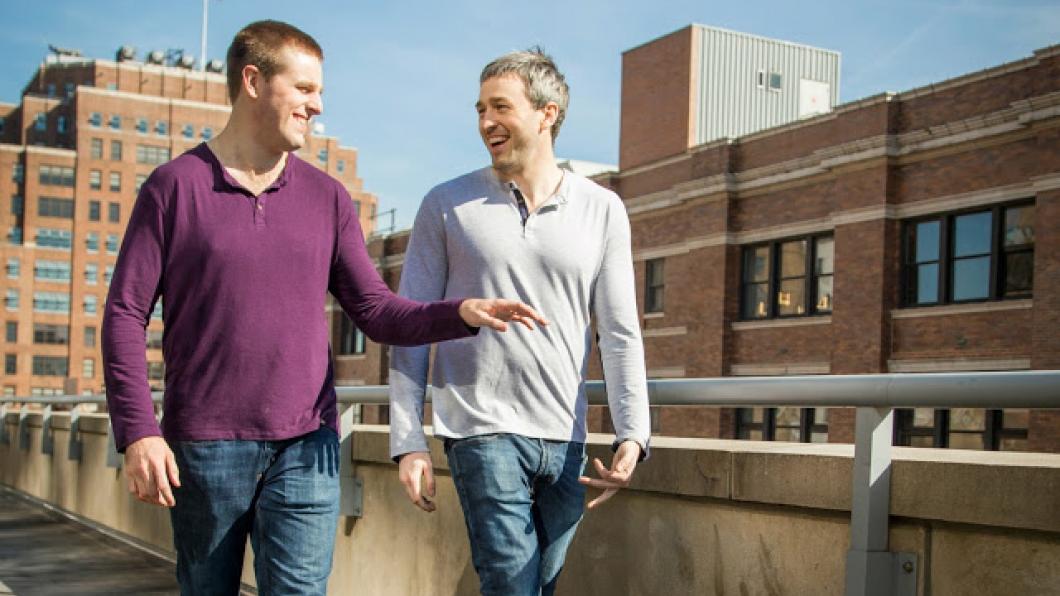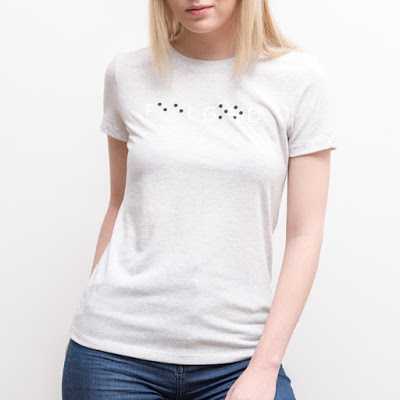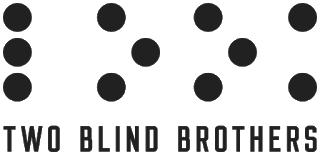
Tailored by touch
Two Blind Brothers is a new luxury clothing brand in New York City named for its owners—brothers Bradford, (right) 31, and Bryan Manning, 26. Bradford and Bryan have Stargardt disease, which is a type of macular degeneration that causes blindness. The company's mission is to cure eye disease by donating all profits to research.
The clothing line tells the brothers' story: Bradford and Bryan use their heightened sense of touch to select the softest fabrics and incorporate braille, their “secret language” as kids, into the design. For example, a metal tag on each shirt is engraved with raised dots that say “brother,”“vision,”or “feel.” At Two Blind Brothers, reading with your fingers is cool. BLOOM interviewed Bryan.
BLOOM: How does Stargardt disease affect you?
Bryan Manning: The big difficulty for me in my day to day is a lot of small things—recognizing faces, reading menus, sometimes navigating New York City. I’ve walked into the wrong Uber many times, which is always a fun incident that gets a couple of laughs and a few weird looks. In my professional life you have to be very detail-oriented in everything you do, especially when worrying about something like buttons on a shirt. You have to really double check your work a lot with visual impairment. A comma and a period can look very similar, as can an ‘o’ or an ‘e.’ So making sure you’re diligent [is important].
BLOOM: Do you still have peripheral vision?
Bryan Manning: With Stargardt, you have trouble metabolizing vitamin A, which destroys your central vision, so there’s a dark blurry spot in the centre of your eye. We have some peripheral vision—it’s not 20/20, but far better, which is why we can get around the city without too many problems. Seeing finer details or distances becomes an issue.
BLOOM: Are there any strategies that help you with that?
Bryan Manning: Having good friends is really beneficial for things like reviewing a menu. The best thing in the world from a technological standpoint is using an iPhone to zoom in. Bradford and I take a lot of photos. If you were to go through my phone you’d wonder ‘Why does he love street signs so much?’ We end up taking pictures to figure out where we are. We both use Apple computers which have a great zoom function. So for day to day, Apple products with zoom are the best thing in the world.
BLOOM: What was it like growing up with vision loss?
Bryan Manning: Our parents were unbelievable. They always allowed us and pushed us to try everything we could dream of. So if we wanted to play soccer or football, we were there every day. They allowed us to try and fail, which is the best thing that ever happened.
As a kid, when you have anything that’s different, you’re going to get a little picked on. So a kid saying ‘How many fingers am I holding up?’ was a common occurrence. But we had a lot of great structure around us. For me, having a big brother I could call and he would turn it into a joke and we’d laugh about it together was a great thing.
It can be frustrating as a child when you don’t quite have all of the coping mechanisms for how to deal with problems. I do think it’s a blessing in its own way because you learn from a young age how to deal with issues. You learn how to slide through a conversation when you don’t recognize a person, and because you have to walk up to a chalkboard to do the math problem, you become a bit more comfortable putting yourself out there.
BLOOM: Did you get the accommodations you needed at school?
Bryan Manning: Anytime we would ask for anything, we got it. We had a vision teacher when we were much younger and she taught us to read braille and gave us a lot of methods to deal with problems. Bradford and I both went to the University of Virginia and it was great. I give a lot of credit to my high school. They were always accommodating, but they also held you to the same standards as the other kids and that was an important lesson.
BLOOM: What was most challenging about growing up with your disability?
Bryan Manning: One of the more challenging things was that with a degenerative disease, they don’t know when the vision loss will stop.
BLOOM: That sounds anxiety-producing.
Bryan Manning: It wasn’t in the forefront of our minds every day, but it was challenging. I give a lot of credit to the support system our parents and vision teacher gave us. They would say ‘Yup, there’s a chance this happens, but we’re not going to think about it. We’re going to live every day, and when we get to a problem, we’ll deal with it.’
BLOOM: Is your sight still deteriorating?
Bryan Manning: It’s different from person to person. There’s a pretty severe decline in the first few years and then a steady progression for 10 years. And then it usually plateaus. For me when I was first in high school I could read 12 point font.
BLOOM: What size font could you read now?
Bryan Manning. I don’t know. 'Big.' I have a wonderful girlfriend who reads everything for me or I zoom in on computers.
BLOOM: There was an essay last week in the New York Times by a guy with physical disabilities who said: ‘Long ago I decided that if I was going to like myself, I had to make friends with the disability that was inherently part of me.’ Was that a process you went through?
Bryan Manning: That is a phenomenal quote. I love that. I do think vision loss is tough, no one will make a claim the other way, but I do see an incredible amount of positives in it. It really has been a bit of a blessing. It’s shaped who I am today and Bradford and I have the best partnership in the world. Bradford and I could always joke about it, so it was never seen as a disability, but as hey, here’s something you have to deal with. We always poked fun at ourselves with it. If you’re willing to accept and make friends with a disability it becomes so much easier and your life becomes a lot simpler and happier.
BLOOM: How did you get the idea for your business?
Bryan Manning: It’s a funny story. We love doing little projects together. We were trying to come up with a way to give back to medical research, which we love so much, but also to a community that has been so great to us. One day we were shopping in Bloomingdale's and we lost each other after about five seconds. That always happens. I need to put a tracker on Bradford. Because we can’t see the clothing that well, we run our hands over everything and when we find something we like we pull it out and take a closer look.
BLOOM: To take a photo then and blow it up?
Bryan Manning: Yes, we’d see what size it is or who makes it and what the quality is. Does it fit us and is it a men’s shirt? Once I chose a women’s shirt. Anyway, this one day we got separated and when we got outside we realized we’d actually bought the same shirt.
BLOOM: You both picked the same shirt—at a store the size of Bloomingdale's?
Bryan Manning: Yes. We had this ‘aha’ moment where we thought maybe there is something to do with touch: there’s a bit of science that when you lose one sense, you become more aware or pay more attention to your other senses because you have to. Bradford and I learned braille from an early age and it’s a whole language based on feel. We believe if you pay attention to it, and focus on it, this sense of touch becomes stronger. We thought we’d build Two Blind Brothers around touch and softness, but also try to create a community around something to do with visual impairment.
BLOOM: How do you describe your clothes?
Bryan Manning: We sell luxury casual wear, but it’s more than that because it’s cause-driven clothing. We don’t take a salary and 100 per cent of our profits go back to medical research. We’re striving to produce not just a shirt we think is the most comfortable you’ll ever put on, but when you wear a Two Blind Brothers shirt, you’re supporting a mission. You’re supporting this fight against blindness. From our standpoint, you’re joining this community and brotherhood around trying to have clothing represent something more than just making money. It represents a value system I believe.
BLOOM: I love that the name and products incorporate things related to blindness and braille. Was this a conscious choice and why?
Bryan Manning: I’m not going to take all the credit. We both learned braille at an early age, which was great because it was a secret language between Bradford and I. Putting braille on the clothing seemed like such an homage to where we came from. Braille is really a relic in that everyone knows what braille is, but no one really knows what it says. So some of our t-shirts say ‘brother,’ ‘look,’ or ‘feel.’ It’s representative of what the brand is. We love the stylistic idea of being able to read the word but have the word stand out to you as well. It’s who we are and what we represent.
BLOOM: I'm glad you didn't shy away from what makes you unique.
Bryan Manning: You have to embrace what is different and unique about you. Everyone has things they’re great at and not so perfect at. Embracing the things you’re not perfect at, and loving yourself for those things, is what makes you happiest, I think.
BLOOM: I understand you’re trying to raise $1 million for research. What type of research are you funding?
Bryan Manning: We’re focused on pre-clinical trials for new gene and stem-cell therapies, where we think we can provide the most value. We’re also working with the Foundation Fighting Blindness, which is 45 years old and is near and dear to our hearts. It’s been a giant beacon of hope for us. We work with them quite often.
BLOOM: I read that you don’t take a salary from the company.
Bryan Manning: Bradford worked in wealth management and I was in data sales and we were successful in our previous careers. Our idea was that we’d rather cure blindness than put another penny in our pocket.
BLOOM: With some disabilities, like autism, there’s a tension in the community between people who want a cure and people who want acceptance and support for those living with the condition. Have you thought about funding programs that improve quality of life for people who are blind?
BLOOM: Bradford and I are more focused on a cure from the monetary standpoint. We’re very big into science and we love that aspect of it. Once you start curing visual diseases, they’re all very related. The eye is a fascinating organism and we think some of this eye research can be expanded to the rest of the body. But that isn’t tomorrow. The idea of acceptance and quality of life and community building is incredibly important to us. Curing blindness is the goal, but there has to be a lot in-between. That’s why we try to talk to our community. We get messages every day that make us smile and laugh and almost cry with just how sweet and kind they are. We try to open dialogue with anyone who’s interested.
BLOOM: There’s an interesting piece on your blog The Blind Spot called 5 Life Hacks For People Who Are Visually Impaired. Will you be offering more content like that?
Bryan Manning: Our limitation right now is manpower. We’re spread pretty thin. We’re redoing our entire website with the hope of having a lot more flexibility to create content, and make the site more interactive and interesting. We’d like to build up the blog and the community side of the site.
BLOOM: Have you faced any obstacles promoting your clothes related to the way our culture devalues disability or difference?
Bryan Manning: That’s a great question. I have only experienced love from everyone we’ve reached out to and everyone we’ve spoken to. There’s been a side of the business that’s shown us how many unbelievable and kind people there are out there in the world. We’ve only felt great and positive things. It’s been humbling to say the least.
Watch Bryan and Bradford Manning talk about Two Blind Brothers on The Ellen Show.

